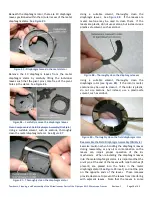
Teardown, Cleaning, and Reassembly of the Miscellaneous Parts of the Olympus BH-2 Microscope Frames
Revision 1
Page 9 of 45
relevant safety data sheet (MSDS or SDS) before using
any unfamiliar solvents. Many of the solvents listed
above are flammable, and their vapors may represent
an explosion hazard if mishandled. Whichever solvents
are chosen, be sure to follow all manufacturer’s
instructions and safety precautions.
Solvent Compatibility with Parts and Finishes
Many solvents will damage the finish of painted
surfaces or will dissolve or damage plastic parts.
Isopropyl alcohol or 409 Cleaner may be safely used to
clean most painted and plastic surfaces. Do not allow
untested solvents to contact the paint or the various
plastic parts, to prevent damage. Before using any
solvent to clean plastic parts, test a small amount of the
solvent in an inconspicuous area of the part (such as
inside a knob) to ensure compatibility with the plastic.
Never use xylene to clean nylon parts, as xylene
dissolves nylon. Isopropyl alcohol and trichloroethylene
will cause swelling of nylon due to solvent absorption.
The list of solvents generally considered safe for nylon
includes acetone, diethyl ether, heptane, mineral
spirits, naphthalene, and turpentine.
Viewing Head Locking Screw
The locking thumbscrew for the viewing head on the
BHS/BHT stands differs from that used on the
BHSU/BHTU stands. The BHS/BHT locking thumbscrew
includes a spring-loaded plunger and consists of six
separate parts. This locking screw can be identified by
the presence of the slotted end-screw in the knurled
outer barrel of the thumbscrew (see
). This
type of locking screw can be difficult to turn, and the
spring-loaded plunger can be stiff or sluggish, due to the
presence of old grease and contaminants in the mating
threads and in the plunger mechanism of the locking
screw.
Figure 2
–
The viewing head locking screw (BHS/BHT)
In comparison, the locking thumbscrew on the
BHSU/BHTU stands does not have the spring-loaded
plunger and consists of just two parts. This locking
thumbscrew can be identified by the lack of the slotted
end-screw (see
). This type of locking screw can
also be difficult to turn due to the presence of old
grease and contaminants in the mating threads of the
locking screw.
Figure 3
–
The viewing head locking screw (BHSU/BHTU)
Servicing the Viewing Head Locking Screw (BHS/BHT)
To restore proper freedom of motion to a stiff BHS/BHT
locking thumbscrew, the locking thumbscrew must be
completely disassembled so that any thick or hardened
grease can be thoroughly removed, and then
reassembled with fresh grease per the following
procedure.
Disassemble the Locking Screw (BHS/BHT)
To disassemble the spring-loaded BHS/BHT locking
thumbscrew, grasp the knurled portion of the outer
barrel of the thumbscrew with soft-jaw pliers, to hold it
stationary (see
Figure 4
–
Hold the threaded outer barrel stationary









































